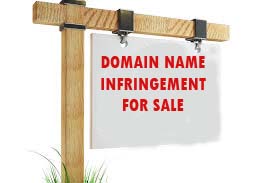
Internet has revolutionized the way of conducting businesses in India to the point that now groceries and perishable goods are being sold online. This means business presence over the internet has become or is becoming inevitable for all kinds of businesses. Not all businesses are luck enough to find domain names of their choices; some are often forced to use domain names way different than their business names. On the other hand, it is not uncommon to see certain domain names, tagged as “premium”, selling for exorbitant prices, with other domain names being “blocked’ (bought and parked) by internet-based companies or individuals without having any legitimate use for it.
Domain Names and Trademarks
Not too long ago, domain names have come to be recognized as a trademark or having a capability to function as a trademark in several jurisdictions across the world – thanks to the international treaties and World Intellectual Property Organisation (WIPO) and The Internet Corporation for Assigned Names and Numbers (ICANN). Many believe registering a domain name creates vested rights or eases up the process of trademark registration or vice versa. Ignorant purchases of domain names receive legal notices from registered trademark owners for alleged infringement immediately or after launching the website.
Domain name and trademark bullying – Don’t get bullied!
Trademark bullying refers to unlawful threats by registered trademark owners (who typically are MNCs or reputed businesses) against small-to-medium business entities alleging infringement. Business entities operating online are often victims of trademark bullying. Statistics show that entities who have conducted due diligence are often confident and tackle bullies and legal notices efficiently than others. Often recipients of infringement notices get extremely panicky and some even take down their websites even without consulting a lawyer – thanks to the happily worded notices.
Why due-diligence search is important?
Due-diligence search or trademark clearance search will determine the potential risks involved in registering the domain. These searches can be restricted to a particular jurisdiction or across several jurisdictions based on the business requirements. The search will help you identify the following:
- Whether the domain name is in conflict with any registered trademark or a famous trademark within your country or overseas?
- Whether there is a potential for likelihood of confusion with any third party websites?
- Potential for infringement law suits?
- Viability of expanding your business to other countries?
7 Things to consider before buying a domain?
- Do not use any part or misspelling of famous trademarks or registered trademarks or any deceptive spellings of any famous websites. For example, the domain name matchdates.com will infringe the famous trademark and website, match.com.
- Do not attempt to register domain extensions of existing websites that are in the same business as yours. For example, match.org infringes match.com.
- Even though you do not have plans to do business outside India, in addition to extensions .in or co.in prefer registering top-level domain extensions (tLD) such as .com, .net, .org.
- If top-level domain extensions are not available, check whether these websites at tLDs have a similar business as yours. a) If yes, please avoid b) If no, you may consider getting an opinion from a trademark attorney before securing the domain
- Before securing the domain, get a comprehensive due-diligence search done through a trademark lawyer to determine the risks.
- Once the above are done and the results are in your favour, make sure you buy a domain from a reputed service provider and you should consider registering the domain name for at least ten (10) years.
- Instead of opting for whois data privacy, you may provide a PO Box address and email ID exclusively for receiving domain-related notifications from registrar or third party. Ensure to provide correct contact details to avoid any unnecessary website downtimes.
7 Things to do after buying a domain
- Launch your website! Make sure you launch your website as soon as the domain name is registered. Buying a domain name and simply parking it without any actual use does not grant you any better right.
- File for a trademark! Do not hesitate to file trademark in relevant international classifications that covers your business. If you have a mobile application, you may consider Class 009.
- Do not steal! Do not use famous trademarks or your competitor trademarks as keywords, meta tags, in your websites for SEO purposes.
- Be original! Ensure the website contents are original and not paraphrased. Search engines prefer original contents.
- Comply with laws! Make sure your website has well-written, specific Terms of Service, Privacy Policy, etc. Update the terms periodically as and when required and post the last updated date on a prominent portion. Hire a lawyer with expertise in internet and cyber laws to draft these documents.
- Sign up with a trademark clearing house! You cannot expect everyone to be law-abiding as you, so you may want to keep a watch on domain name squatters. Subscribing to trademark clearinghouses can alert you as well as the person attempting to buy a domain that is same or similar to yours.
- Copyright! File for copyright registration of images, logos, articles, etc.
